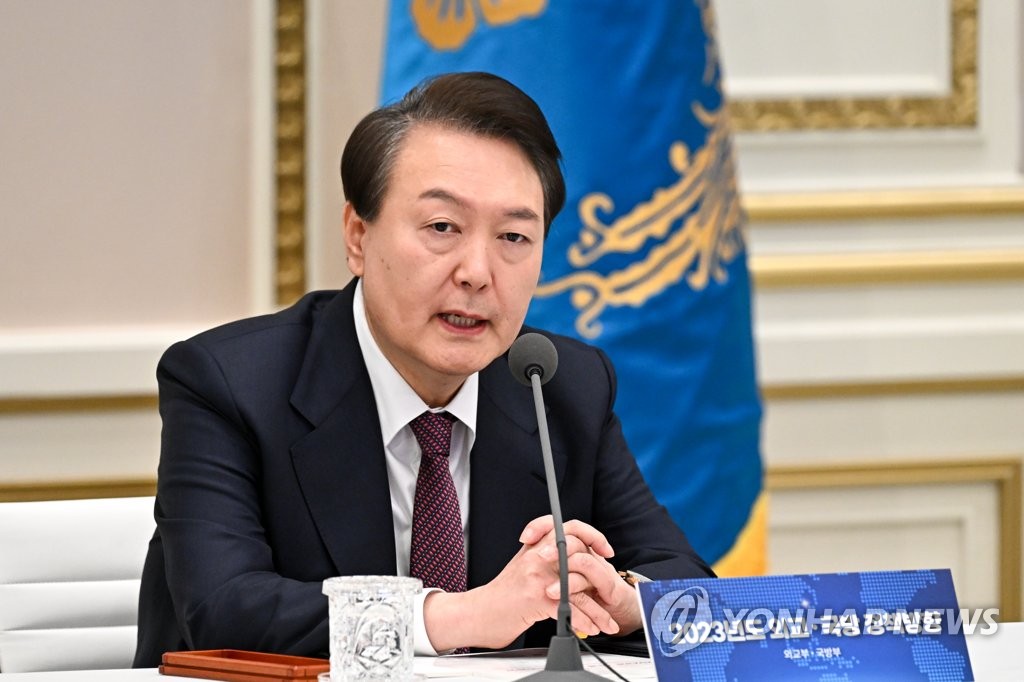- California Assembly OKs highest minimum wage in nation
- S. Korea unveils first graphic cigarette warnings
- US joins with South Korea, Japan in bid to deter North Korea
- LPGA golfer Chun In-gee finally back in action
- S. Korea won’t be top seed in final World Cup qualification round
- US men’s soccer misses 2nd straight Olympics
- US back on track in qualifying with 4-0 win over Guatemala
- High-intensity workout injuries spawn cottage industry
- CDC expands range of Zika mosquitoes into parts of Northeast
- Who knew? ‘The Walking Dead’ is helping families connect
Yoon says Japan’s moves to bolster defense are hard to stop
President Yoon Suk Yeol said Wednesday that Japan’s moves to bolster its defense capabilities are hard to stop in the face of the threat of North Korea’s missiles.
Yoon made the remark during a joint policy briefing from the foreign and defense ministers, referring to Japan’s recent increase in its defense budget and its inclusion of the “counterstrike” concept in its revised security documents.

“We can wonder how a country adopting a pacifist constitution can do such things, but if there are missiles flying over their heads and the possibility of a nuclear strike, it’s not easy to stop,” he said during the meeting at the former presidential compound of Cheong Wa Dae.
“Japan increased its defense budget because there are IRBMs flying over their heads, and decided to include the so-called ‘counterstrike’ concept in its defense plan,” he said, referring to intermediate-range ballistic missiles that North Korea fired over Japan. “How can anyone take issue with that?”
Yoon also stressed the need to respond firmly to North Korea’s nuclear and missile provocations, saying the most important component of the “three-axis” deterrence system is the Korea Massive Punishment and Retaliation (KMPR), an operational plan to incapacitate the North Korean leadership in a major conflict.
“We have to deter the mind for provocations by firmly establishing the KMPR,” he said. “Firmly building a KMPR capability that allows us to strike back 100 times or 1,000 times more if we are attacked is the most important method for preventing attacks.”
Yoon also mentioned the possibility of South Korea’s own nuclear armament, saying that if North Korea’s provocations intensify, “The Republic of Korea could deploy tactical nuclear weapons or possess its own nukes.”
“If that happens, we’ll be able to get hold of them sooner with our science and technology,” he said.
Yoon added a caveat, however, that it is important to choose a realistically possible method.
“Right now we’re having discussions about South Korea and the United States sharing information, participating together, and conducting joint planning and joint execution,” he said.
Foreign Minister Park Jin said his ministry will pursue a “principled” approach toward North Korea and reinforce cooperation with the international community for the North’s denuclearization.
Late last month, South Korea unveiled the details of its Indo-Pacific strategy, with a focus on promoting freedom, peace and prosperity through the establishment of a rules-based order and cooperation on human rights.
Park said the ministry will make efforts in earnest to fulfill the vision for a free, peaceful and prosperous Indo-Pacific region.
In the face of multiple crises, the ministry will help companies in the fields of construction, nuclear power plants and defense make inroads into foreign markets, Park said.
Defense Minister Lee Jong-sup said the ministry will build “overwhelming” response capabilities to counter North Korea’s nuclear and missile threats.
Lee briefed Yoon on six lines of efforts to cope with the North’s threats, including a build-up of intelligence, surveillance and reconnaissance systems, and an improvement in the response capabilities against North Korean drones.
The six also included bolstering joint military drills with the United States and establishing the Strategic Command.











